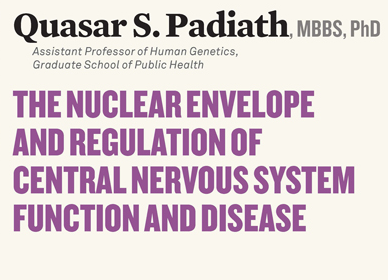 |
 |
|
|||
 |
|
||||
 |
|
||||
 |
|
||||
 |
|
||||
 |
|
||||
 |
|
||||
 |
|
||||
 |
|
||||
 |
Topic Overview: Research in the last few decades has revolutionized our understanding of the nuclear envelope and its contribution to cellular function. Originally thought of as a purely structural component, we now know that the nuclear envelope is critical in regulating a wide variety of cellular processes. At the organismal level, the nuclear envelope has also been implicated in both normal and pathological aging. Padiath’s research aims to decipher novel functions for the nuclear envelope at the intersection of disease, development, and aging, with a specific emphasis on the central nervous system (CNS). His research identified mutations of the gene Lamin B1 as the cause of the demyelinating disorder autosomal dominant leukodystrophy (ADLD). The Lamin B1 protein is part of the nuclear lamina, a network of intermediate filaments that is a critical component of the nuclear envelope. Padiath’s discovery revealed an entirely novel role for the nuclear lamina in CNS function. Using a combination of patient-based genetic analysis and animal and cell culture models, he and lab members have attempted to identify the pathways linking the nuclear lamina to myelin regulation. This research has implications not only for ADLD therapy, but it may also help shed light on other common demyelinating disorders like multiple sclerosis.
|
|
|
||
 |
|
||||
 |
|
||||
 |
|
||||
|
|
|
||||
 Unable to make it to Scaife Hall? Dr. Padiath’s lecture will available via live stream to people with Pitt login credentials by clicking this link (sign in using your Pitt username and password):
Unable to make it to Scaife Hall? Dr. Padiath’s lecture will available via live stream to people with Pitt login credentials by clicking this link (sign in using your Pitt username and password):